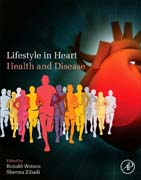
Lifestyle and Heart Health and Disease provides a comprehensive evaluation of lifestyle factors that modify heart function and structure. It includes coverage of a wide range of lifestyle factors, including physical activity, alcohol, tobacco, drugs of abuse, nutrition and psychosocial factors. The book clearly presents the scientific evaluation of published research relating to general responses by scientists, physicians and patients, along with new research on the role of lifestyle in the prevention, amelioration and causation of cardiac remodeling and disease. Explains the pathogenic mechanisms of cardiovascular diseases and the targets of therapyPresents methods contained within the book that can be applied to the diagnosis of heart diseaseContains a concise summary with recommendations for actions and conclusionsProvides a one-stop-shopping synopsis of key ideas associated with many aspects of lifestyle INDICE: Part 1 Overview and Mechanisms 1. Primary prevention of stroke by a healthy lifestyle in a high-risk group 2. Healthy lifestyle and decreasing risk of heart failure in women 3. Assessing lifestyle coaching plus care coordination versus care coordination alone versus treatment as usual to reduce risks of cardiovascular disease in adults with schizophrenia and abdominal obesity 4. Effect of Lifestyle-Focused Text Messaging on Risk Factor Modification in Patients With Coronary Heart Disease 5. Effect of an intensive lifestyle intervention on atrial fibrillation risk in individuals with type 2 diabetes 6. Community-based comprehensive lifestyle programs in patients with coronary artery disease 7. Modifiable cardiovascular risk factors in adults aged 40-79 years in Germany with and without prior coronary heart disease or stroke 8. Low Fitness in Midlife: A Novel Therapeutic Target for Heart Failure with Preserved Ejection Fraction Prevention 9. (In)activity-related neuroplasticity in brainstem control of sympathetic outflow: unraveling underlying molecular, cellular, and anatomical mechanisms 10. A Healthy Lifestyle Score Is Associated with Cardiometabolic and Neuroendocrine Risk Factors 11. Oxidative stress and human hypertension: vascular mechanisms, biomarkers, and novel therapies 12. Psychosocial and neurological effects on heart health and disease Part 2 Exercise 1. Incidence of high blood pressure in children - effects of physical activity and sedentary behaviors 2. Physical activity and cardiorespiratory fitness as major markers of cardiovascular risk: their independent and interwoven importance to health status 3. Lifestyle modification decreases arterial stiffness in overweight and obese men: dietary modification vs. exercise training 4. Aging and physical function in type 2 diabetes: intensive lifestyle intervention 5. Changes in lifestyle [exercise] modestly reduce the estimated cardiovascular disease risk 6. Team-based Care for Cardiac Rehabilitation and Exercise Training in Heart Failure 7. Passive movement and active exercise for very young infants with congenital heart disease 8. Prognostic Value of Oxygen Kinetics During Recovery From Cardiopulmonary Exercise Testing in Patients With Chronic Heart Failure 9. Characterization of exercise limitations by evaluating individual cardiac output patterns: a prospective cohort study in patients with chronic heart failure 10. Atrial fibrillation modified by different levels of physical activity levels at different ages 11. Relationship between physical activity and cardiovascular aging 12. Exercise associated improvement in coronary artery disease patients 13. Cardiac disease at risk in the young athlete 14. Healthy aging on the cardiopulmonary hemodynamic response to exercise Part 2 Alcohol 1. Alcohol and cardiovascular diseases: where do we stand today? 2. Moderate red wine consumption is associated with a lower prevalence of the metabolic syndrome 3. Estrogen modulation of the ethanol-evoked myocardial oxidative stress and dysfunction via DAPK3/Akt/ERK activation in male rats 4. Alcohol consumption, hypothalamic gene expression changes in the dilated cardiomyopathy signaling pathway 5. Alcohol consumption and risk of atrial fibrillation Part 4 Tobacco 1. Pathobiology of tobacco smoking and neurovascular disorders 2. The Contribution of Tobacco Use to High Health Care Utilization and Medical Costs in Peripheral Artery Disease 3. A randomized controlled trial of the efficacy and safety of varenicline for smoking cessation after acute coronary syndrome 4. Migraine and risk of stroke in older adult smokers 5. Production of prostaglandin E2 induced by cigarette smoke modulates tissue factor expression and activity in endothelial cells 6. Risk of death from cardiovascular disease associated with low-level arsenic exposure among long-term smokers 7. Preterm birth and future risk of maternal cardiovascular disease - is the association independent of smoking during pregnancy
- ISBN: 978-0-12-811279-3
- Editorial: Academic Press
- Encuadernacion: Rústica
- Páginas: 396
- Fecha Publicación: 01/02/2018
- Nº Volúmenes: 1
- Idioma: Inglés
